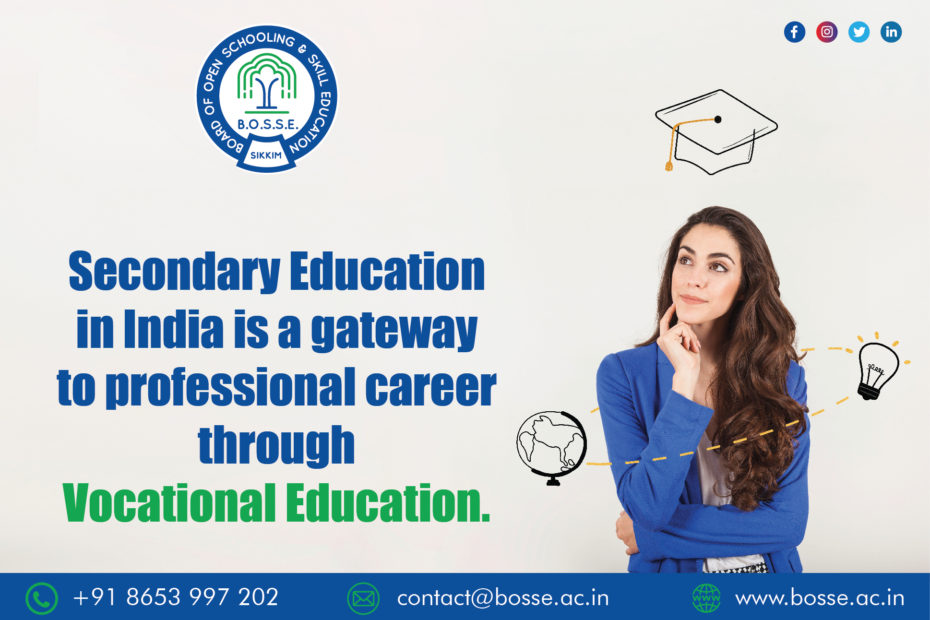In India, secondary education refers to the educational stage that follows primary education and typically covers students in the age group of 14 to 18 years. Secondary education plays a crucial role in the Indian education system and serves as a bridge between the foundational knowledge acquired in primary school and the specialization that comes with higher education or vocational training. Like BOSSE , National Institute of Open Schooling (NIOS) also imparts secondary education. Here are some key features of secondary education in India:
Age Group: Secondary education typically caters to students aged 14 to 18, encompassing grades 9 to 12.
Curriculum: The curriculum in Indian secondary education is more specialized and in-depth compared to primary education as well as vocational education. It includes a wide range of subjects, such as mathematics, science, social studies, language arts, and optional subjects like computer science, physical education, and vocational courses.
Examinations: Secondary education in India is marked by the crucial board examinations at the end of grade 10 (Secondary School Examination, or Class 10 board exams) and grade 12 (senior Secondary Examination, or Class 12 board exams). These board exams are conducted by various state and central education boards, such as the Central Board of Secondary Education (CBSE) and various state boards.
Transition: This phase is a critical transition point for students, as they decide whether to pursue higher education, vocational training, or enter the workforce after completing secondary education.
Certification: Upon successful completion of secondary education, students receive certificates such as the Secondary School Certificate (SSC) for Class 10 and the Higher Secondary Certificate (HSC) for Class 12. These certificates are essential for pursuing further education or employment opportunities.
Medium of Instruction: The medium of instruction can vary depending on the state or educational board, with English and regional languages being commonly used.
Stream Choice: In Class 11 and 12, students typically choose a particular stream based on their interests and career aspirations. The three primary streams are Science, Commerce, and Arts (Humanities).
Preparation for Competitive Exams: Many students in India engage in rigorous preparation for various competitive entrance exams for admission to prestigious colleges and universities in fields such as engineering, medicine, and management.
It’s important to note that the specifics of secondary education in India can vary from one state to another and may be influenced by the educational board governing a particular region. For instance, the CBSE and the Indian Certificate of Secondary Education (ICSE) are two major central boards that follow a national curriculum, while various state boards have their own curricula and examination systems. Additionally, private and government schools in India may offer alternative educational programs within the secondary education framework.
The Board of Open Schooling and Skill Education (BOSSE) in India provides an alternative system of secondary education for learners who may not be able to pursue a traditional education in regular schools for various reasons
Flexible Learning: BOSSE offers flexibility in terms of the learning process. It caters to learners who may not be able to attend regular schools due to reasons such as distance, work commitments, health issues, or other personal circumstances.
Age Group: BOSSE secondary education is typically designed for students aged 14 and above.
Curriculum: BOSSE follows a curriculum that is similar to that of other recognized boards of secondary education in India. It includes subjects such as mathematics, science, social studies, languages, and vocational courses.
Examinations: BOSSE conducts examinations at the secondary level, which is equivalent to the Class 10 board exams in the traditional education system. Successful candidates receive the BOSSE Secondary Certificate.
Study Materials: BOSSE provides study materials and resources to registered learners, allowing them to study at their own pace. Learners have the flexibility to choose subjects and courses according to their interests and needs.
Examination Centers: BOSSE has examination centers across the country, making it convenient for learners to appear for their exams.
Recognition: BOSSE certificates are recognized by the government of India and are considered equivalent to certificates issued by other recognized boards. BOSSE qualifications are accepted for further education and employment purposes.
Streams: BOSSE offers various streams at the secondary level, including the academic stream, vocational stream, and the open basic education (OBE) program for learners with special needs.
Online Learning: BOSSE has also expanded its reach through online learning platforms, enabling learners to access study materials and resources digitally.
Adult Education: BOSSE caters to adult learners who wish to complete their secondary education. It provides opportunities for adults to continue their education and earn secondary-level qualifications.
BOSSE has been instrumental in providing education to a diverse group of learners, including school dropouts, working professionals, homemakers, and individuals with special needs. It plays a vital role in promoting inclusive education in India by offering a flexible and accessible pathway to secondary education.
